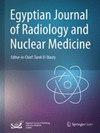The prediction value of lipiodol retention pattern on post-TACE CT scan for local progression of HCC after complete response
IF 0.5
Q4 RADIOLOGY, NUCLEAR MEDICINE & MEDICAL IMAGING
Egyptian Journal of Radiology and Nuclear Medicine
Pub Date : 2024-03-29
DOI:10.1186/s43055-024-01242-x
引用次数: 0
Abstract
Hepatocellular carcinoma (HCC) is classified as the sixth commonest cancer over the world and the fourth common in Egypt, representing the third leading cause of cancer-related mortality. Trans-arterial chemoembolization (TACE) is considered as one of the most effective treatment option for intermediate stage HCC. Lesions showing complete response (CR) after TACE can be classified according to their lipiodol retention pattern into complete (C-Lip, covering the entire tumor volume) or incomplete (I-Lip). The purpose of this study was to assess the prediction value of post-TACE lipiodol retention pattern on the local disease progression after complete response and thus to decide which patient should be carefully observed and considered to be incompletely treated. The study included 45 HCC lesions treated with TACE and showed complete response in the first follow-up CT performed 4–6 weeks after the procedure; 23 cases showed incomplete lipiodol retention pattern and 22 with complete lipiodol retention pattern which was carefully assessed on non-contrast CT images done 4 to 6 weeks after treatment. Follow-up CT was then performed every 3 months for at least 12 months or until local progression occurred. On the follow-up CT studies, 20 out of the 45 lesions showed persistent complete response (i.e., no local progression), while 25 of them showed local progression. Among the 25 cases with disease progression upon correlation with their lipiodol retention pattern, it was found that local progression occurred in 31.8% of tumors showed CR with complete lipiodol retention, as opposed to 78.2% of tumors showed CR with incomplete lipiodol retention with significant statistical difference and p value 0.010. Lipiodol retention pattern of HCC after TACE can predict the potential tumor local outcome. Lesions with incomplete lipiodol retention are at a higher risk of local tumor progression and therefore should probably observed and can be retreated; on the other hand, tumors with complete lipiodol retention have a much lower risk of local disease tumor progression.TACE 后 CT 扫描中脂碘潴留模式对完全缓解后 HCC 局部进展的预测价值
肝细胞癌(HCC)在全球最常见癌症中排名第六,在埃及排名第四,是癌症相关死亡的第三大原因。经动脉化疗栓塞术(TACE)被认为是治疗中期肝细胞癌最有效的方法之一。TACE后出现完全反应(CR)的病变可根据其脂肪碘保留模式分为完全反应(C-Lip,覆盖整个肿瘤体积)和不完全反应(I-Lip)。本研究的目的是评估 TACE 后脂肪碘滞留模式对完全反应后局部疾病进展的预测价值,从而决定哪些患者应仔细观察并被视为治疗不完全。研究纳入了45例接受TACE治疗的HCC病灶,这些病灶在术后4-6周进行的首次CT随访中显示为完全反应;23例显示为不完全脂碘滞留模式,22例显示为完全脂碘滞留模式,这些病例在治疗后4-6周进行的非对比CT图像上进行了仔细评估。随后每 3 个月进行一次 CT 随访,持续至少 12 个月或直到出现局部进展。在后续的 CT 检查中,45 个病灶中有 20 个显示出持续的完全反应(即局部无进展),而 25 个则显示出局部进展。在这 25 例出现病变进展的病例中,根据其脂碘潴留模式进行相关研究发现,31.8% 的肿瘤表现为完全脂碘潴留的 CR,而 78.2% 的肿瘤表现为不完全脂碘潴留的 CR,两者之间存在显著的统计学差异,P 值为 0.010。TACE 后 HCC 的脂碘滞留模式可预测潜在的肿瘤局部预后。脂碘滞留不完全的病变局部肿瘤进展的风险较高,因此可能需要观察并进行治疗;而脂碘滞留完全的肿瘤局部病变肿瘤进展的风险要低得多。
本文章由计算机程序翻译,如有差异,请以英文原文为准。
求助全文
约1分钟内获得全文
求助全文
来源期刊

Egyptian Journal of Radiology and Nuclear Medicine
Medicine-Radiology, Nuclear Medicine and Imaging
CiteScore
1.70
自引率
10.00%
发文量
233
审稿时长
27 weeks
 求助内容:
求助内容: 应助结果提醒方式:
应助结果提醒方式:


